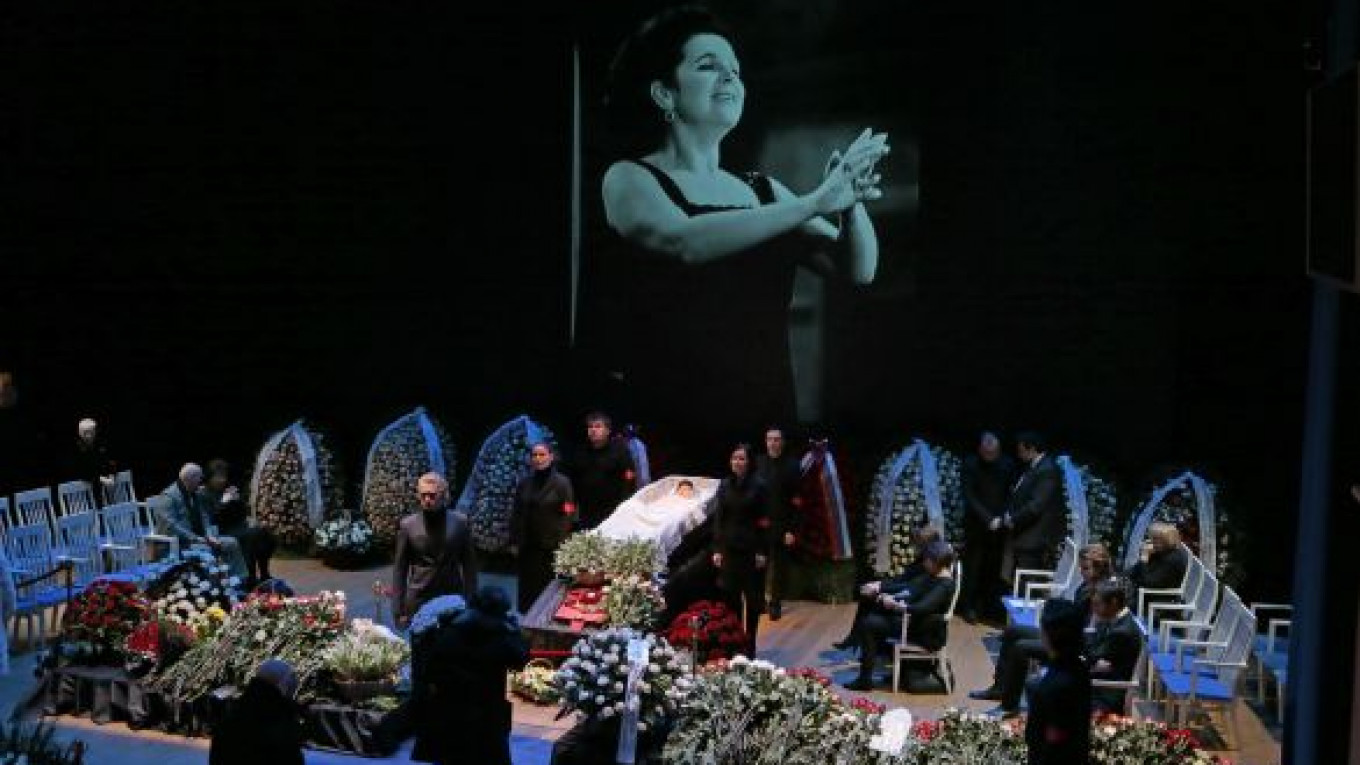Over the past few days, the world has lost four great musicians whose art flourished in the second half of the 20th century: Indian sitar virtuoso Ravi Shankar, American jazz pianist and composer Dave Brubeck, and two operatic sopranos, Switzerland-born Lisa Della Casa and Russia's own Galina Vishnevskaya, both of whom combined beauty of voice with physical beauty and remarkable acting skill on stage.
Слушая Пение
Женский голос как ветер несется,
Черным кажется, влажным,
ночным,
И чего на лету ни коснется —
Все становится сразу иным.
Заливает алмазным сияньем,
Где-то что-то на миг серебрит
И загадочным одеяньем
Небывалых шелков шелестит.
И такая могучая сила
Зачарованный голос влечет,
Будто там впереди не могила,
А таинственный лестницы взлет.
Анна Ахматова
19 декабря 1961 (Никола Зимний)
Больница им. Ленина
[Вишневская пела
"Бразильскую Баховиану"]
I was privileged to hear Shankar, Brubeck and Della Casa at live performances and to be briefly introduced to the latter two. As for Vishnevskaya, who died Tuesday at age 86 and whose funeral is due to take place Friday morning at Christ the Savior Cathedral, I know her voice only from recordings. But I count myself fortunate to have become fairly well-acquainted with her during the final decade of her life, both as a neighbor for several years in the House of Composers on Gazetny Pereulok and from interviews and numerous other encounters at the Opera Center on Ulitsa Ostozhenka that bears her name.
Vishnevskaya was an enormously talented singer and actress. But had she not also possessed an almost superhuman will and determination, she might never have gained the renown she eventually enjoyed, both at home and throughout the musical world.
Born in Leningrad in 1926, Vishnevskaya grew up in a poor and dysfunctional family, survived the wartime siege of her native city, was denied academic musical training and almost miraculously overcame a tubercular infection that threatened to end her singing career. In 1952, following eight years on the operetta stage in Leningrad, she boldly, and without much prospect of success, took an opportunity to audition for the Bolshoi Theater. She found herself not only hired but almost immediately debuting on the Bolshoi stage as Tatyana in Pyotr Tchaikovsky's "Eugene Onegin."
Over the next 22 years, Vishnevskaya became the principal attraction of opera at the Bolshoi, performing more than 30 roles, notably — in addition to Tatyana — Violetta in Giuseppe Verdi's "La Traviata," the title roles in Verdi's "Aida" and Giacomo Puccini's "Tosca" and "Madame Butterfly" and Natasha in Sergei Prokofiev's "War and Peace." She also met with great success in major opera houses abroad, beginning with her debut in 1964 at Teatro alla Scala in Milan as Liu in Puccini's "Turandot."
The singer's days at the Bolshoi ended abruptly in 1974, when she and her famed cellist husband, Mstislav Rostropovich, were sent into exile, principally for giving shelter at their dacha to the writer Alexander Solzhenitsyn. Sixteen years later, by which time Vishnevskaya had retired from the stage, she and Rostropovich were welcomed back to their homeland. And a few years later — again with great will and determination — she set about creating the Opera Center, which, since its opening in 2001, has quite successfully prepared young conservatory graduates for careers on the operatic stage.
In my first encounters with Vishnevskaya, I was somewhat intimidated by her formidable presence and rather stern countenance. But on further acquaintance, especially in a pair of lengthy interviews, I discovered a very warm-hearted individual with a mischievous sense of humor. And perhaps above all in my memories of her over the years was the deep and very sincere concern she displayed for the young singers of her Opera Center and for the present and future of the operatic art.
The death of Vishnevskaya inevitably brings to mind the oft-quoted lines written 51 years ago by the poet Anna Akhmatova after hearing Vishnevskaya in a radio broadcast sing the magical aria from Brazilian composer Heitor Villa-Lobos' Bachiana Brasileira No. 5. Akhmatova's lines defy literal translation. But what she wrote of Vishnevskaya was essentially this: With a voice of such power and charm, it is not a grave that lies ahead of you but a mysterious staircase leading upward.
A Message from The Moscow Times:
Dear readers,
We are facing unprecedented challenges. Russia's Prosecutor General's Office has designated The Moscow Times as an "undesirable" organization, criminalizing our work and putting our staff at risk of prosecution. This follows our earlier unjust labeling as a "foreign agent."
These actions are direct attempts to silence independent journalism in Russia. The authorities claim our work "discredits the decisions of the Russian leadership." We see things differently: we strive to provide accurate, unbiased reporting on Russia.
We, the journalists of The Moscow Times, refuse to be silenced. But to continue our work, we need your help.
Your support, no matter how small, makes a world of difference. If you can, please support us monthly starting from just $2. It's quick to set up, and every contribution makes a significant impact.
By supporting The Moscow Times, you're defending open, independent journalism in the face of repression. Thank you for standing with us.
Remind me later.






